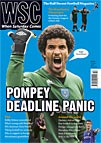 With Ipswich hoping to rename a stand in tribute to Bobby Robson, Csaba Abrahall assesses the former manager's impact
With Ipswich hoping to rename a stand in tribute to Bobby Robson, Csaba Abrahall assesses the former manager's impact
Planning permission permitting, when Ipswich meet Newcastle at the end of September, Portman Road’s North Stand will be renamed in honour of Sir Bobby Robson, who died in July after a battle against cancer lasting almost two decades. It promises to be a day of celebration of the career of a man who managed both clubs with distinction.
Robson’s tenure at St James’ Park featured three consecutive top-five finishes. With the passing of each traumatic year at Newcastle, he appears ever more successful. Meanwhile, his not inconsiderable achievements with England and his trophy-winning experience with club sides in the Netherlands, Portugal and Spain earned him admiration at home and abroad.
But for Ipswich supporters, it is the transformation of our small provincial club into major players on the domestic and European stage that will remain his outstanding achievement. Ipswich had experienced some success before his arrival. The club won the Championship under Alf Ramsey and were returned to the top division by Bill McGarry, but it was Robson who gave the club the proud history that it is constantly and fruitlessly trying to recreate. Robson did much to make Ipswich what they are – or what they once were and would like to be again.
In the ten seasons up to Robson’s departure for the England job in 1982, Ipswich finished outside the top six on only one occasion – and in that year they won the FA Cup. For a decade, they were consistently better than Man Utd, Arsenal and almost everyone else. Even allowing for the considerably more even playing field of the day, that was a remarkable accomplishment.
It was achieved in a way that demanded appreciation – on the cheap and with a commitment to attractive, attacking football. With little licence to venture into the transfer market, Robson made a useful habit of throwing young players in at the deepest of deep ends and helping them develop into full internationals. His signings were necessarily few and served a clear purpose. The groundbreaking recruitment of Arnold Muhren and Frans Thijssen, for example, brought about a change of playing style that revived an ageing team and carried the club to further success.
As Ipswich made their mark, alternative employment opportunities arose for Robson at Everton, Derby, Leeds and Barcelona. But he and Ipswich had developed a mutual dependency and the club ensured he was paid well enough to retain his commitment to the team’s continued development.
It was a project that bore fruit in 1980-81, when Robson’s outstanding Ipswich side was arguably the best team in Europe. That they failed to bring home the silverware to reflect their quality was largely due to the squad being stretched beyond its limits by the sort of schedule that would leave today’s managers taking an axe to the fixture computer. At Easter, Ipswich played Arsenal on the Saturday, then had an East Anglian derby on the Monday and a UEFA Cup semi-final second leg in Cologne on the Wednesday. It’s little wonder their challenge for the title ultimately faltered. UEFA Cup victory was decent consolation, but Ipswich’s failure to win the League remained one of Robson’s biggest regrets.
Even at Ipswich, Robson was not immune to the sort of criticism to which he would later become accustomed as England manager. Success came only after a number of years of dissent from supporters, disputes with players and disappointing results that Roy Keane currently seems keen to emulate. Many fans shared his dissatisfaction at the meagre number of trophies his talented side won. But given that the decade of glory he engineered has been followed by 25 years of virtual non-achievement, to grumble would be ingratitude on a large scale. The move to rename the North Stand after him was prompted by supporters, testimony to the fact that we appreciate what he did. The enthusiastic minutes of applause around the country at the start of the season suggest that that appreciation is shared.
When I was at school, and the FA Cup final was a rare televised-football treat, we would pick a team to support and chant their name at each other across the playground. In 1978, for reasons long forgotten, I chose to cheer on Robson’s Ipswich as they took on Arsenal. After watching their 1-0 victory, the first football match I ever saw, Ipswich became my team. Their success had won me over. Such was Robson’s impact that a decision to follow them based on what were essentially glory-hunting motives seemed not at all ludicrous, neither then nor in the years that followed.
And thus did the influence of Bobby Robson draw me to football, to his team and to the North Stand. I have kept coming back in the forlorn hope that Ipswich may once again be the club that he made them. It seems fitting that, from now on, I will be doing so from the Sir Bobby Robson Stand.
From WSC 272 October 2009